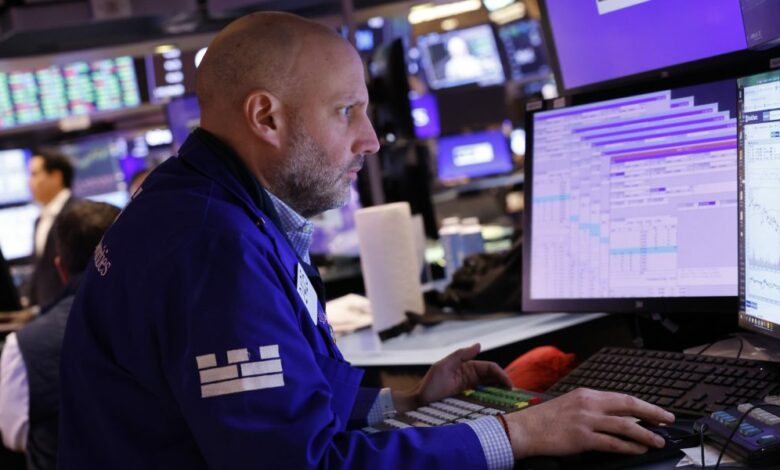Wall Street on edge as momentum trading wraps up historic quarter


The simplest stock strategy on Wall Street — beloved by the smartest minds in finance and more — just closed out its best quarter in more than two decades.
Now a cohort of investment pros from JPMorgan Chase & Co. to PGIM Quantitative Solutions are ramping up warnings that the trend-chasing trade looks ripe for a crash.
Known as the momentum factor, the rules-based investing style that buys up winners over the past year like the mighty Nvidia Corp. — while selling losers like Warner Bros. Discovery Inc. — has notched its best quarter since 2002, according to a long-short portfolio compiled by Bloomberg.
Investors have bought into the artificial-intelligence promise in droves, sending valuations for the stock market’s biggest winners soaring on bets this game-changing technology will rain profits in the years ahead — regardless of the twists and turns in the American economy.
Yet the relentless US economic expansion is starting to lift up underloved corners of the stock market, just as the Federal Reserve stirs chatter it’s becoming more tolerant than expected of still-sticky inflation. That’s raising the prospect new equity winners will emerge soon enough like energy and small caps — two sectors that have sorely lagged the American market’s frenetic rally over the past year.
These kinds of projections have misfired again and again with high performers like Meta Platforms Inc. posting an earnings bonanza. Yet any sharp rotation out of the winners in favor of the losers — a potentially healthy outcome for the broader market — would come at a particularly painful time. Momentum is among the factors that have seen the largest increases in crowding this year, Sanford C. Bernstein data show, while investors have piled $2 billion into the strategy via exchange-traded funds.
“We may be at higher risk of a momentum crash because inflation might not come down as smoothly as equity markets are expecting,” said Stacie Mintz, head of quantitative equity at PGIM Quantitative Solutions. “Timing momentum is tricky – it’s like riding a wave and trying to decide when to jump off before it crashes.”
In this holiday-shortened week before the release of key inflation data Friday, the small-cap Russell 2000 rose 2.5% and a long-short value strategy posted its fourth straight week of gains – both signs of a market shift that’s favoring riskier trades.
The S&P 500 rose 0.4% this week while the Nasdaq 100 slipped 0.5%. In a throwback to the heady days of 2021, Donald Trump’s Trump Media & Technology Group Corp surged after going public through a blank-check merger.
The stock mania has offset choppy trading in Treasuries with a Bloomberg-compiled 60/40 portfolio up 3.6% this quarter. Among so-called factors commonly tracked by quantitative equity investors – characteristics driving stock returns – momentum, value and profitability are all in the green in 2024, Bloomberg indexes show.
The AQR Equity Market Neutral Fund – a bellwether for systematic factor portfolios – has made money every month this year, taking its return to nearly 12%.
The momentum strategy has a history of nasty crashes, usually when a sudden risk-on shift causes underperforming companies to surge — such as after a Covid vaccine was announced in November 2020. While definitions of momentum can vary, the common way of ranking shares by their one-year returns paints a strategy that’s going long on Big Tech and short on cyclical sectors like financials and energy – putting it at risk of a reflationary rotation.
Adding to naysayers’ concerns are signs that the trade has become too beloved for its own good, with JPMorgan strategists warning that it’s the most crowded since the global financial crisis.
Meanwhile, momentum trading is getting choppy amid signs the US economy is still growing at a healthy clip while Fed Chair Jerome Powell last week stopped short of issuing new hawkish warnings over easing financial conditions. Meanwhile inflation, though cooling, remains a threat.
Any material broadening of the equity advance would be welcome news to many stock pickers given the famously lopsided nature of market gains. In recent weeks, the likes of energy and industrial sectors have risen to high positions on the leaderboard, while the outperformance of technology has narrowed.
“With the Fed appearing to be less concerned about inflation or looser financial conditions, reflation trades are coming back into vogue,” wrote Morgan Stanley strategists led by Michael Wilson. “The internals of the market appear to be onto this.”
The team accordingly upgraded energy to overweight, citing steady oil prices and attractive valuations. Meanwhile, Barclays Plc sees money going into cyclical laggards like banks, energy and chemicals.
At Jefferies, strategists split the difference: Advising clients to stay on the momentum trade but focus on equities whose earnings estimates are also getting upgraded, such as Nvidia, Netflix Inc. and The Gap Inc.
Over at Wealth Enhancement Group, Ayako Yoshioka is pairing momentum bets with value shares — and says an easing of the rally in top performers is more likely than an outright crash.
“We’re heading into earnings season, we could have hotter-than-expected inflation data,” said the senior portfolio manager, who sits on a committee running $6.5 billion following factor-based strategies. “A lot of that could potentially cool things, but I don’t think it’s going be that drastic of a move.”
Source link




